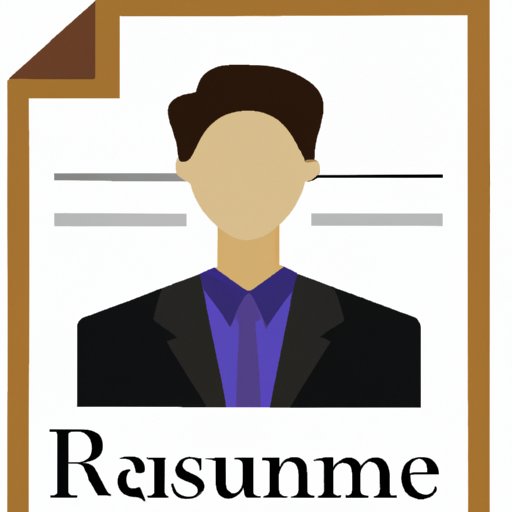
I. Introduction
Your education can be a crucial factor in landing your dream job. It shows a potential employer that you have the knowledge and skills necessary to succeed in the position. With that being said, knowing how to effectively put your education on your resume can be challenging. This article is designed to provide useful tips on how to highlight your education on a resume.
II. The Importance of Highlighting Academic Achievements
One of the best ways to showcase your education on a resume is to highlight your academic achievements. This includes honors, awards, and relevant coursework. By listing these achievements, you can demonstrate your skills and expertise in a particular subject area.
For example, if you received an academic scholarship, you should include that on your resume under the “Education” section. Similarly, if you earned a high GPA, you should include that as well. If you took any advanced classes or specialized coursework, you should list those too. Highlighting your academic achievements is an effective way to show expertise in a particular area.
III. Emphasizing Extracurricular Activities
While academic achievements are important to list, it’s also essential to highlight any extracurricular activities that demonstrate skills and qualities that can be applied to the job. For example, if you were the captain of a sports team, this can show leadership skills. If you were a member of a debate club, this can demonstrate excellent communication skills.
Think about any relevant extracurricular activities that could give you an edge over other candidates. Don’t be afraid to list creative hobbies, such as doing photography or painting, which can showcase skills such as creativity and innovation. The key is to be strategic and considerate when listing your extracurricular activities, as they can set you apart from other applicants.
IV. Showcasing Relevant Continuing Education
Continuing education is essential for professional growth, and listing any professional development courses, trainings, and workshops that you have undergone can demonstrate your commitment to learning and skill development.
For example, if you took a training course for Microsoft Excel, you should list that under the “Education” section of your resume. If you took a course on coding or SEO, this can demonstrate expertise in a particular field.
Listing relevant continuing education courses can also show potential employers that you have a breadth of knowledge and experience beyond your formal education.
V. Including Certifications
In addition to continuing education, listing any professional licenses or certifications you have earned can provide evidence of your expertise and knowledge in a specific field. For example, if you are a certified public accountant, you should definitely include that on your resume.
Similarly, if you have earned any industry-specific certifications that are relevant to the position you are applying for, make sure to list them. This can show potential employers that you have the necessary skills and knowledge to excel in the job.
VI. Explaining Gaps in Education
If you have taken a break from formal education, had periods of unemployment, or undergone an alternative route to education, it’s essential to explain them on your resume.
Don’t be afraid to address these gaps head-on and use them as opportunities to showcase skills and qualities that are relevant to the job. For example, if you took time off to travel, you can use that to highlight your adaptability and flexibility. If you worked during a period of unemployment, you can show responsibility and work ethic.
The key is to spin these gaps in a positive light and demonstrate how the experiences you have had can be applied to the job you are applying for.
VII. Listing Relevant Skills Gained from Education
Your education can provide you with a wide array of skills that are transferable across industries and positions. It’s essential to draw attention to skills such as research, writing, and critical thinking that are gained from your education.
For example, if you have a degree in English literature, you can demonstrate strong writing skills. If you have a degree in biology, you can demonstrate research skills. Make sure to describe these skills in a way that showcases your abilities and how they can be applied to the job you are applying for.
VIII. Using a Functional Resume Format
If you have more experience than education or want to highlight certain skills, using a functional resume format can be beneficial. This format emphasizes skills and experience over a strict chronological education timeline.
For example, if you had several years of work experience in a relevant field, you can list that experience before your education section. If you have technical skills that are relevant to the job, you can list those before your education as well. The key is to tailor your resume to the job you are applying for and demonstrate how your education and experience are relevant to that position.
IX. Conclusion
In conclusion, effectively showcasing your education on a resume is essential for landing your dream job. It’s important to highlight your academic achievements, extracurricular activities, relevant continuing education, certifications, and skills gained from education. By using a functional resume format and addressing any gaps in education, you can demonstrate your skills and expertise in a way that sets you apart from other applicants. Remember, your education is an investment in yourself, and showcasing it effectively on your resume can help you to achieve your career goals.





